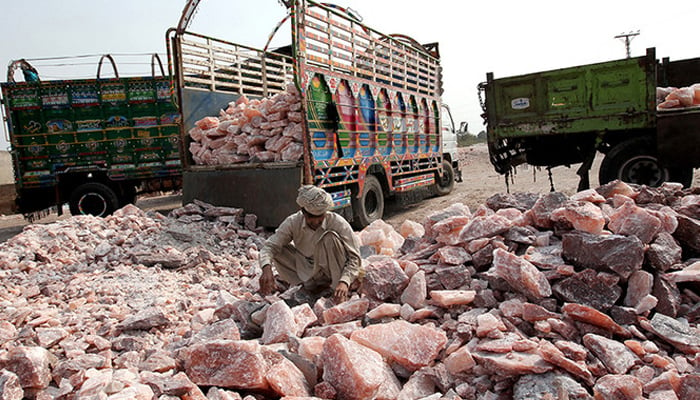Red Sea crisis threatens Pakistan’s salt exports, industry body warns
"Our salt exporters are navigating through an unprecedented crisis," SMAP acting chairman Qasim Yaqoob Paracha says
KARACHI: Pakistan's salt export industry is facing a severe crisis due to disruptions in the Red Sea, which have caused a sharp rise in shipping costs and threatened the viability of the sector, an industry body said on Wednesday.
The Salt Manufacturers Association of Pakistan (SMAP) urged the government to take immediate measures to stabilize freight charges, provide incentives to exporters, and support the state-owned Pakistan National Shipping Corporation (PNSC) to increase its capacity and offer competitive rates.
"Our salt exporters are navigating through an unprecedented crisis," SMAP acting chairman Qasim Yaqoob Paracha said in a statement. "We need a comprehensive government response to address the multifaceted challenges we face."
He highlighted the role of the PNSC, the national flag carrier, in the crisis, and urged the corporation to add more ships to its fleet and temporarily operate in the Red Sea route, which would benefit not only the salt exporters but also other Pakistani exporters.
"Our National Shipping lines play a significant role in this crisis by adding more ships to their fleet and temporarily operating in this route."
Paracha said the ongoing conflict in Yemen, which has affected the security and traffic of the Red Sea, had forced many shipping companies to reroute their vessels, resulting in a surge in freight costs that had become unaffordable for many exporters.
He said the SMAP had proposed several solutions to the government to help the salt exporters cope with the crisis, such as temporary subsidies, negotiated shipping rates, or alternative routes to reduce the freight costs.
Paracha also called for the implementation of targeted incentives for salt exporters, such as freight rebates or temporary tax relief, to bridge the cost gap and stimulate export growth, safeguarding the industry and the jobs it sustains.
He said that the PNSC should offer competitive rates, dedicated shipping routes, and prioritize Pakistani cargo, symbolizing national self-reliance and supporting the revival of exports.
Moreover, Paracha emphasized that the positive outcomes of government intervention would extend beyond the salt export industry, and benefit the overall economy and various sectors.
"A stabilized shipping environment not only safeguards the economic backbone of our nation but also benefits other Pakistani exporters, contributing significantly to the country's foreign exchange reserves and the overall economic health and sustainability of various sectors," he said.
Paracha called upon the Federal Minister for Maritime Affairs, the Ministry of Commerce, and other relevant authorities to grasp the gravity of the situation and act promptly.
"The future of the salt export industry is at stake, and decisive action is imperative for its survival," he said.
-
 Prince William On Verge Of Breakdown Because Of 'disgraced' Andrew
Prince William On Verge Of Breakdown Because Of 'disgraced' Andrew -
 Tig Notaro Reflects On Oscar Nod For 'Come See Me In The Good Light': 'I Was Sleeping'
Tig Notaro Reflects On Oscar Nod For 'Come See Me In The Good Light': 'I Was Sleeping' -
 Kenyon Sadiq Sets 40-yard Dash Record At NFL Scouting Combine, Eyes First Round
Kenyon Sadiq Sets 40-yard Dash Record At NFL Scouting Combine, Eyes First Round -
 Talk Show Host Drops Hint About Taylor Swift, Travis Kelce Wedding Date
Talk Show Host Drops Hint About Taylor Swift, Travis Kelce Wedding Date -
 Andrew Scandal Brings New Worries For Prince Harry, Meghan Markle
Andrew Scandal Brings New Worries For Prince Harry, Meghan Markle -
 King Charles Imposes New Restrictions On Ex-Prince Andrew In Surprise Move
King Charles Imposes New Restrictions On Ex-Prince Andrew In Surprise Move -
 Chris Hemsworth Reveals How Elsa Pataky Guides His Career Moves
Chris Hemsworth Reveals How Elsa Pataky Guides His Career Moves -
 Was Travis Barker In A Relationship With Kim Kardashian Before Marrying Her Sister?
Was Travis Barker In A Relationship With Kim Kardashian Before Marrying Her Sister? -
 Brad Pitt Feeling Down In The Dumps After Kids' Snubs As Pals Continue To Paint Angelina Jolie A Villain
Brad Pitt Feeling Down In The Dumps After Kids' Snubs As Pals Continue To Paint Angelina Jolie A Villain -
 Ex-PM Speaks Out On Andrew Mountbatten-Windsor In Newspaper Column
Ex-PM Speaks Out On Andrew Mountbatten-Windsor In Newspaper Column -
 Eric Dane Remembered In Glowing Tribute By Trans Activist In 'Grey's Anatomy'
Eric Dane Remembered In Glowing Tribute By Trans Activist In 'Grey's Anatomy' -
 Zach Braff, Sarah Chalke Explain J.D. And Elliot Twist In 'Scrubs' Revival
Zach Braff, Sarah Chalke Explain J.D. And Elliot Twist In 'Scrubs' Revival -
 Jim Carrey's Death To Body Double: Comedian's Latest Appearance Sparks Conspiracy Theories
Jim Carrey's Death To Body Double: Comedian's Latest Appearance Sparks Conspiracy Theories -
 Aespa's Ningning Steals Spotlight With Hilarious Viral Video From Milan Fashion Week
Aespa's Ningning Steals Spotlight With Hilarious Viral Video From Milan Fashion Week -
 Should Benedict Be Forgiven For Mistress Question? 'Bridgerton' Star Yerin Ha Reveals
Should Benedict Be Forgiven For Mistress Question? 'Bridgerton' Star Yerin Ha Reveals -
 John F. Kennedy Jr. Wife Carolyn Bessette's Last Minute Bridal Crisis Revealed
John F. Kennedy Jr. Wife Carolyn Bessette's Last Minute Bridal Crisis Revealed




